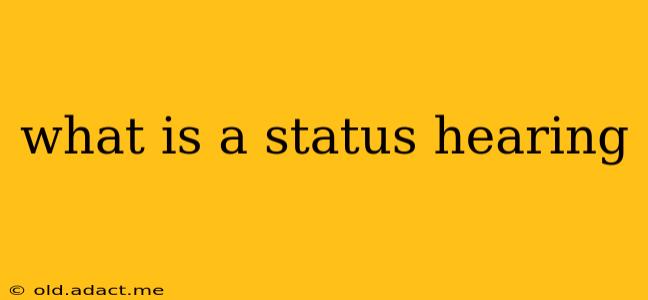A status hearing, often referred to as a case management conference or progress report, is a meeting between the judge, lawyers, and sometimes the parties involved in a legal case. It's not a full-blown trial; instead, it's a check-in to assess the progress of the case and identify any potential roadblocks. The goal is to keep the case moving efficiently and towards a timely resolution. Think of it as a progress report, ensuring everyone is on the same page and working towards a common goal.
What Happens During a Status Hearing?
The specifics of a status hearing vary depending on the jurisdiction, the type of case, and the judge's preferences. However, some common elements include:
- Reviewing the Case's Progress: The judge will inquire about the progress made since the last hearing or the initiation of the case. This includes reviewing completed tasks, such as discovery (the exchange of information between parties), expert witness reports, and any motions filed.
- Identifying Outstanding Issues: The judge and attorneys will discuss any unresolved issues that might be hindering the case's progress. This could include disputes over evidence, scheduling conflicts, or disagreements over procedural matters.
- Setting Deadlines: The judge will likely set deadlines for completing outstanding tasks, such as filing motions, completing discovery, or scheduling expert witness depositions. Meeting these deadlines is crucial to keeping the case on track.
- Scheduling Future Hearings: The next hearing date, whether another status hearing or a trial date, is often set during the status hearing.
- Exploring Settlement Options: While not always the focus, the judge might encourage the parties to explore settlement options to avoid a full trial. This often involves informal discussions between the attorneys.
- Addressing Procedural Matters: Minor procedural issues, such as requests for extensions or clarifications on court rules, are frequently addressed during a status hearing.
Why are Status Hearings Necessary?
Status hearings serve several crucial purposes:
- Case Management: They provide a structured way to manage complex cases, ensuring efficiency and preventing delays.
- Early Dispute Resolution: By identifying and addressing potential problems early, status hearings can help resolve disagreements before they escalate.
- Cost Efficiency: By keeping the case moving efficiently, status hearings can help reduce overall legal costs for all parties involved.
- Fairness and Transparency: They ensure transparency and fairness by keeping all parties informed of the case's progress and any potential challenges.
Who Attends a Status Hearing?
Typically, the following individuals attend a status hearing:
- The Judge: The presiding judge oversees the hearing.
- Attorneys for all Parties: Attorneys representing each party involved in the case are required to attend.
- Sometimes the Parties Themselves: In some cases, the parties involved (e.g., the plaintiff and defendant) may also be required to attend, particularly if settlement discussions are a significant part of the hearing. This is less common than attorney-only status hearings.
What if I Miss a Status Hearing?
Missing a status hearing can have serious consequences. The judge may impose sanctions, such as fines or even dismissal of the case. It's crucial to attend all scheduled hearings or inform the court well in advance if you are unable to attend and request an adjournment.
How Long Does a Status Hearing Last?
The duration of a status hearing varies widely depending on the complexity of the case and the number of outstanding issues. Some hearings may last only 15-20 minutes, while others can extend for an hour or more.
What is the difference between a status hearing and a trial?
This is a key distinction! A status hearing is a brief procedural meeting to check progress and address administrative issues. A trial, on the other hand, is a full-blown proceeding where evidence is presented, witnesses testify, and the judge or jury renders a verdict. The trial is where the ultimate resolution of the case happens, whereas a status hearing is just a checkpoint along the way.
This comprehensive overview should provide a clearer understanding of what a status hearing entails. However, specific procedures might vary slightly based on your location and the court's rules. Always consult with a legal professional for advice specific to your situation.
